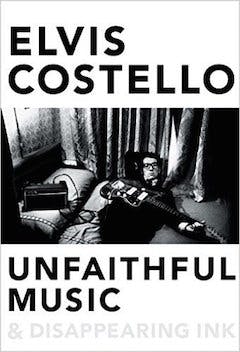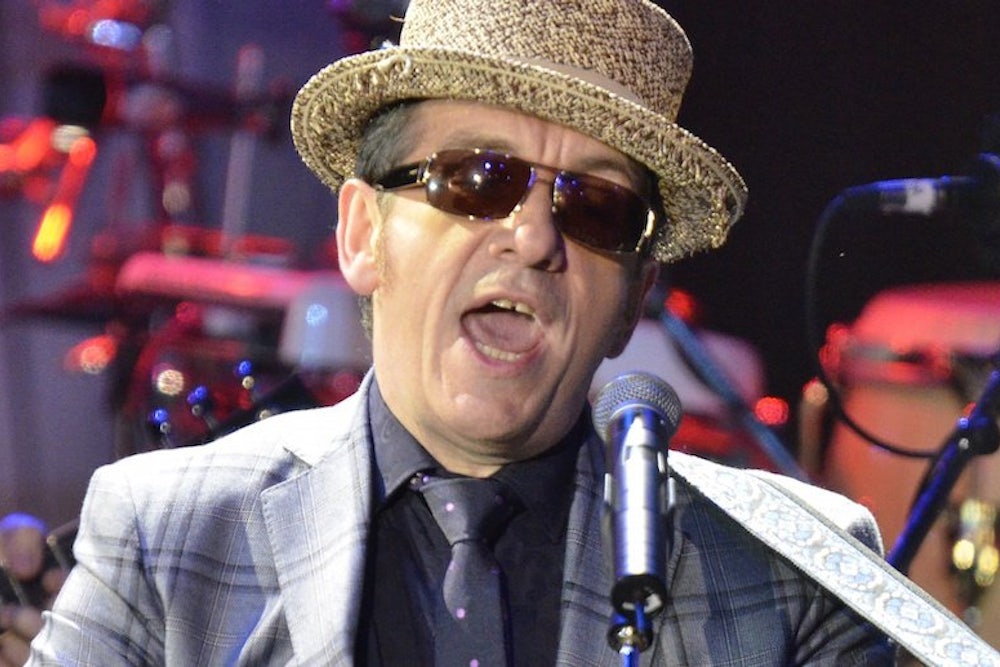About halfway into Elvis Costello’s enthralling memoir Unfaithful Music & Disappearing Ink, we’re flung back fifty years from a sodden and lascivious 1978 U.S. tour (groupies, pills, gin) to the birth of Costello’s singer-trumpeter father Ronald “Ross” Patrick MacManus in 1927. The year of Ross’s birth, we learn, was also the “year that ‘Are You Lonesome Tonight?’ was first published, the year of ‘Potato Head Blues’ by Louis Armstrong and ‘Stardust’ by Hoagy Carmichael. It was the year in which Jerome Kern published ‘Ol’ Man River’ and the Gershwin brothers asked the musical question ‘How Long Has This Been Going On?,’ Cole Porter presented ‘Let’s Misbehave,’ Rodgers and Hart wrote ‘My Heart Stood Still,’ and Charley Patton recorded his song about the Mississippi flood, ‘High Water Everywhere’…”

This is family history as musical encyclopedia, and to listen to Costello recount his life is to be buttonholed by an enthusiastic fan. Fandom for Costello is inseparable from the compulsion to write songs and, it seems, to understand his own life. Even when his father is in the final stages of Parkinson's—some of the most moving and painful pages of the book—the curator son plays him Gene Austin singing “My Blue Heaven” in the hope that it will trigger a pleasant memory. "Did papa [meaning his grandfather Patrick] like this song?" Costello asks and his ailing father replies “Of course.”
Fortunately for the fan of Costello’s music the topic of discussion is often his own songs, and he is, unsurprisingly, a witty and eloquent guide. There is none of the cryptic evasiveness of Dylan or McCartney’s chipper toss offs. Along the way we get a picaresque tale about how the only child of a Merseyside big band singer and a fiercely independent Liverpudlian woman (who one day marched into Selfridges and talked her way into a job managing the music department) became one of the great songwriters of the last fifty years.
One of the more enduring (and largely apocryphal) bits from this story is that, before he became “Elvis Costello”, Declan Patrick MacManus worked as a “computer programmer” at the Elizabeth Arden cosmetics company. The truth is less glamorously brainy: “The IBM computer didn’t even have a monitor screen,” Costello recalls “so reams of paper were wasted on the mundane dialogue between man and circuitry. If you entered an incorrect command, the IBM golf-ball printer simply typed out ‘Error’ in response. If you made the same mistake more than twice, the printer had been programmed to reply: ‘You’ve Fucked It Up Again You Stupid Bastard.”
One of the luckier things to happen to the fledgling songwriter was hooking up with the three musicians that became his backing band after he placed an ad in Melody Maker in the summer of 1977. The Attractions, it cannot often enough be said, completely slayed. The rhythm section of Bruce and Pete Thomas (no relation) could turn on a dime from four-on-the-floor punk rock to delicate Tin Pan Alley balladry. Royal College of Music trained Steven Nason—soon to be christened ‘Steve Nieve’ when he allegedly asked, at some point on the first US tour, “What is a groupie?”—added dappled swirls of Farfisa organ, at once anchoring and decorating the harmony. About the Attractions Costello says that they “could play rings around everybody else. I just had to stand in the middle and sing.”
The early American tours seem to have been chaotic and confrontational. The drinking and lecherousness is dealt with in jump-cut summaries of blurry nights and wake up calls amidst Holiday Inn wreckage (Costello was at the time married to his first wife, and the word “unfaithful” in this book’s title seems in part to acknowledge his perpetual drunken philandering). For the southern leg of the tour he dons an “employee name tag on my lapel that read Kurt, which is how I preferred the band to address me in the company of southern strangers”; this for fear of inviting violence for some perceived ‘Elvis’ heresy.
We see the boys in a rented station wagon, drinking warm beer from a brown paper bag listening over and over to a handful of cassettes, among them Abba’s Arrival, Iggy Pop’s The Idiot, and the Bowie-Eno avant pop collaboration Low:
Those ominous Berlin synthesizer sounds were probably never imagined as a soundtrack for a dawning stretch of highway on the Tennessee–Kentucky border, but they seemed perfect for my alien mood.
Out of this weird cocktail of gigs, gin, motels, Bowie, Iggy and Abba emerged Armed Forces, Costello’s third record and among his best. The songs are a miracle of bright concision; the parts fly out like panels in a Calder mobile. Written after he saw young British soldiers patrolling the streets of Belfast, the single “Oliver’s Army” became an improbable hit and Costello found himself thrust into the role of pop star. He notes that part of the tune’s immediacy comes from a “sparkling piano part [modeled] on an Abba record.” Judging from the octave-hopping triads my guess is that they nicked it from “Dancing Queen”
An increasingly famous Costello is excited to meet his heroes. He meets Dylan for the first time backstage at the Universal Ampitheatre in Los Angeles where Bob is in the middle of the Street Legal tour. “I’ve heard a lot about you” Bob says, to which Costello replies: ‘I’ve heard a lot about you, too.”
He makes a lovely country-tinged record with Elvis Presley’s backing band, and soon after sits in with Springsteen to honor Roy Orbison. He orchestrates over fax machine with Burt Bacharach. He crosses Paul McCartney’s path first in 1979, when the Attractions are opening for Wings, and a second time at Air studios in London, where he’s making Imperial Bedroom and Macca is down the hall working on Tug of War. (Also in the studio at this time is Alice Cooper, “a very likable fellow and completely free of snakes”).
The non-stop drinking and road fatigue led to an infamous—and near career-ending—incident in a Columbus Ohio hotel bar, where a sloshed Costello found himself in an argument with members of the Stephen Stills touring entourage and allegedly made awful racial slurs about Ray Charles and James Brown. Singer Bonnie Bramlett slapped him in the face, a couple of Stills’s roadies dislocated his shoulder, and Bramlett promptly called up as many newspapers as she could get on the phone to tell them what had happened. When Costello writes about this episode in Unfaithful Music, he emphasizes his deep appreciation of these musicians’ work, movingly recalling hearing Ray Charles sing “Sorry Seems to Be the Hardest Word,” saying Charles’s delivery of the song’s first line as “one of the great moments of music I’ve ever known.”
By the end of this loosely chronological (and big!) book he is married to jazz singer and pianist Diana Krall and hanging with more luminaries—Aretha, Doc Watson, Oscar Peterson, Jerry Lee Lewis, Joni. Somewhere along the way Costello gets a gig as the ultimate professional fan, hosting the TV show Spectacle, interviewing musicians he admires with thoughtful (sometimes wonky) questions and then performing with them. Around the time of the TV gig (2009) the memoir begins to circle obliquely around questions of vocation, as Costello reflects morosely on a gutted record industry. At one point he admits he is not such a big fan of himself:
The trouble with finishing any autobiographical tome like this is that for every mildly diverting tale or precious memory you eventually arrive at this thought: I don’t much care for the subject.
The self-doubt keeps looping back throughout Unfaithful Music, and it can seem like the zeal of fandom is what has kept him going through bouts of uncertainty. The summer before he turns fourteen, for instance, Declan is working a weekend job in a greengrocer’s. He takes his pay to Potter’s music shop in Liverpool and plunks down installments on a mock-Martin acoustic, his first guitar. After half is paid off he gets to take it home: “I proudly carried the guitar back over the Thames, wondering if anyone passing by mistook me for a musician.”
Correction: A previous version of this article misstated the title of Elvis Costello's memoir.
